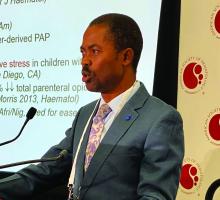ORLANDO – Oral arginine supplementation significantly increased plasma arginine levels and improved acute pain-related outcomes in Nigerian children with sickle cell disease in a randomized, placebo-controlled, phase 2 trial.
Of 68 children with a mean age of 10 years who were hospitalized with vaso-occlusive crisis involving severe pain and treated with standard pain management, 35 were randomized to receive adjuvant oral L-arginine at a dose of 100 mg/kg every 8 hours for 5 days or until discharge, and 33 received placebo. Those in the arginine arm experienced a 125% increase in their plasma arginine level, compared with a 29% increase in the placebo arm, Richard Onalo, FC Paed, reported during a press briefing at the annual meeting of the American Society of Hematology.
“This was statistically significant,” Dr. Onalo, of the department of pediatrics at the University of Abuja, Nigeria, said of the difference between the two arms. “Also, the global bioavailability ratio increased by 59% in the arginine arm.”
Low plasma arginine levels are associated with acute pain requiring hospitalization in Nigerian children with sickle cell disease, and have also been shown in a prior study in the United States to predict pediatric vaso-occlusion, Dr. Onalo said, adding that arginine supplementation, which has known opioid-sparing effects, was found in another phase 2, randomized, placebo-controlled U.S. study to significantly decrease pain scores.
In the current study, the increase in arginine bioavailability inversely correlated with Medication Quantification Scale scores, which were 73 vs. 120 in the arginine and placebo arms, respectively (r = -0.35; P = .02), indicating reduced analgesic use in the arginine arm, he said.
“Clinically, the patients in the arginine arm also tended to have a faster resolution in their pain score,” he said.
Despite similar baseline Numerical Pain Scale (PS) scores (8.7 and 8.4 on a 0-10 scale), day 5 pain scores were 1.2 vs. 2.0, and the mean daily rate of decline was 1.5 vs. 1.1 cm/day.
Crisis resolution was achieved by 25% of the patients in the arginine arm in about 72 hours, compared with about 120 hours in the placebo arms.
“By day 5, 54% of patients on arginine were already home, as compared with just 24% in the placebo arm, and this was found to be clinically and statistically significant,” Dr. Onalo said, noting that mean hospital length of stay was 110 hours vs. 156 hours in the arginine and placebo arms, respectively.
A non–statistically significant decrease in mean total opioid dose was also observed in the arginine vs. placebo arms (3.8 vs 5.1 mg/kg; P = .11).
Arginine supplementation in this study was safe; no serious treatment-related adverse events occurred, and there were no significant differences between the groups in the incidence of adverse events. Dr. Onalo noted, however, that a trend toward more vomiting was observed in the arginine versus the placebo arm (20% vs. 3%, P = .07).
Severe vaso-occlusive pain episodes are a major cause of morbidity and mortality in sickle cell disease, and based on the prior findings – and the lack of data regarding the role of arginine for treating acute sickle cell-related vaso-occlusive pain episodes in sub-Saharan Africa – Dr. Onalo and colleagues set out to assess its role in that setting.
“Also, we are interested in finding a molecule that can be used easily by the patient at home, and also can be [self-administered],” he said.
Children enrolled in the double-blind study had a severe vaso-occlusive pain episode, defined by a PS score of at least 7 on a scale of 0-10, at one of two major hospitals in Abuja, Nigeria. All patients received pain management, including opioid and nonopioid analgesics, per institutional practice.
The findings reinforce the role of arginine in vaso-occlusive pain episodes, and suggest that oral arginine is a promising adjuvant therapy for vaso-occlusive crisis management in patients with sickle cell disease, he said.
“We recommend a phase 3 multicenter clinical trial,” he added.
As for a potential role for arginine in this setting in the United States, prevention trials in the U.S. have thus far been negative, said Julie Panepinto, MD, the press briefing moderator and a pediatric hematologist-oncologist at Children’s Hospital of Wisconsin, Milwaukee.
“This is my first knowledge of use in the acute setting,” said Dr. Panepinto, also a professor at the Medical College of Wisconsin in Milwaukee. “There is going to be some future work looking at use of arginine in the U.S. for patients presenting with pain.”
For now, however, it’s too early to say that all patients should be started on arginine, she said, adding that more information is needed, including about appropriate dosing.
Nonetheless, it’s encouraging to see positive findings, she noted.
“We’ve been looking at and thinking about arginine for a long time, so I think this is a really exciting study ... that should lead us to future work to really understand better how to use the medication,” she said.
Dr. Onalo reported having no disclosures. Dr. Panepinto has received research funding from the National Institutes of Health and the Health Resources and Services Administration.
SOURCE: Onalo R et al. ASH 2019, Abstract 613.



